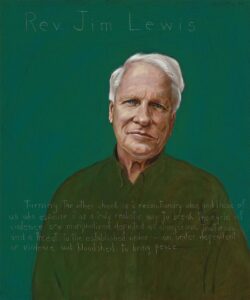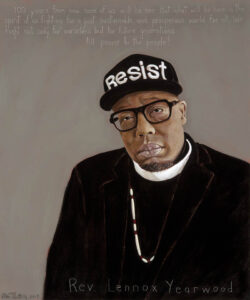What's New
Leadership Education at Duke Divinity features AWTT portraits
Duke University has recognized AWTT in a recent article “Honoring those who speak truth to power,” published by the school’s Faith and Leadership online learning resource.
In her article, journalist Leslie Quander Wooldridge explores the prominence of faith-based leaders in the AWTT portrait collection and how the portraits are being used as learning tools for spiritual and ethical inquiry.
“It’s no coincidence that many of Shetterly’s subjects are people of faith and that faith communities have exhibited his work.
“ ‘We are encouraged often to think about finding our ethics in our economy, in how many jobs have we got, are people being paid a fair wage, what kind of innovation can we do,’ Shetterly said.
“But in faith communities, he said, fundamental values like compassion, dignity, truth telling and courage are the ones that must first align.”
Wooldridge goes on to describe Shetterly’s interactions with students at St. Paul’s School in Concord, New Hampshire, and programming around the paintings at First Church in Cambridge (Massachusetts). She also highlights Truth Tellers, the inspirational documentary film about Shetterly’s work and the lives of his portrait subjects. She writes about Shetterly’s artistic process and the relationships he has developed with many of his portrait subjects.
“What Robert Shetterly does is he tells narratives of truth so that those who look at his images, his paintings, and hear his story … will live into a truth that is loving, life-giving and liberating,” said Charles Wynder, of St. Paul’s School, noting that the essence of truth allows us to liberate ourselves.
“Developing global leaders who pursue truth — seek to live it, strive to tell it, work to protect it — is foundational to not only our faith journey but the aims of religion and faith: to see the divine in others, to find ourselves together [in a way that] recognizes our connectivity and our particularity,” Wynder said.

